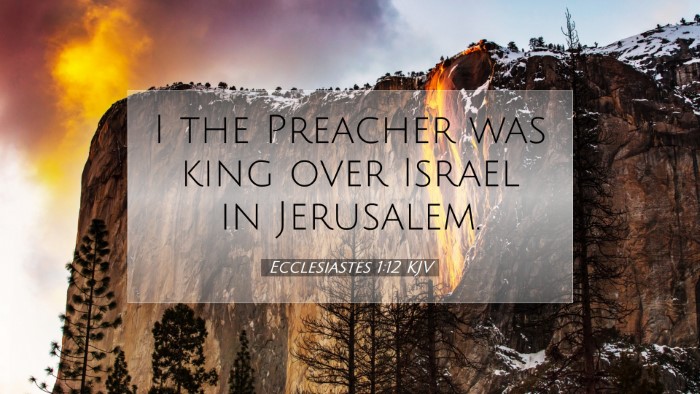Commentary on Ecclesiastes 1:12
Verse Text: "I the Preacher was king over Israel in Jerusalem." - Ecclesiastes 1:12 (ESV)
Overview
The book of Ecclesiastes, traditionally attributed to Solomon, explores the meaning of life and the futility of worldly pursuits. In verse 1:12, the author identifies himself as “the Preacher” (or “Qoheleth” in Hebrew), indicating his role in imparting wisdom drawn from a life of experience.
Authorial Identity and Role
Matthew Henry states that the title "Preacher" reflects a position of authority and responsibility to teach and guide the people. Solomon, acknowledged as the wisest king of Israel, intricately combines his royal status with a humble seeking of understanding.
Albert Barnes emphasizes that the significance of being "king over Israel" portrays the depth of knowledge that comes from a life lived at the pinnacle of secular power and wisdom. This context endows his reflections with both weight and credibility.
The Search for Meaning
From the outset, this verse introduces a central theme in Ecclesiastes: the quest for meaning amidst the mundane. Adam Clarke notes that despite Solomon's unprecedented wealth and wisdom, he engages in a profound exploration of human existence, hinting at an underlying sense of dissatisfaction.
As he reflects on his life, the Preacher portrays a duality; having everything yet still seeking something beyond material success. This existential search resonates with both clergy and laity, illustrating a universal human experience.
Wisdom and Understanding
Matthew Henry asserts that Solomon's role as a king doesn't exempt him from grappling with the complexities of life. His staggering wealth and wisdom are juxtaposed against a backdrop of fleeting joys and enduring disappointments. This establishes a premise: true wisdom lies not just in knowledge but in the humility to pursue truth.
Albert Barnes elaborates that the Preacher embodies the search for ultimate truth, one that transcends simple observations about life. The king's privilege provides him a unique perspective, allowing him to scrutinize all forms of wisdom and folly with critical eyes.
Empirical Observation
The phrase "was king over Israel in Jerusalem" conveys a sense of authority while also grounding the Preacher's reflections in historical reality. Adam Clarke points out that this quote denotes a period of great prosperity and development, yet paradoxically, it also highlights the ephemeral nature of such elements.
As he returns to this place of kingship, he notes that even the glory of a kingdom pales in light of life's inherent transience, setting the tone for his remarks throughout Ecclesiastes.
Conclusion: The Nature of Sovereignty
Matthew Henry concludes by reiterating that even the mightiest of kings is bound by the same laws of existence as the lowliest individual. This creates an egalitarian perspective close to the heart of Ecclesiastes: we are all under the sun, seeking answers to questions that often remain unanswered.
Ecclesiastes 1:12 serves as a significant starting point for theological reflection. It invites readers, be they pastors, students, or scholars, to contemplate the deeper meanings of their own pursuits within the framework of divine sovereignty and human limitation.
This Commentary's Relevance Today
As we engage with the text, we are prompted to consider how our own “kingships,” be they in ministries, workplaces, or communities, can lead us to honest self-examination. The pursuit of wisdom, like the Preacher’s, often necessitates a sobering reckoning with the fleeting nature of all that we chase in life.
In a world fraught with distractions and superficial goals, the message embedded within Ecclesiastes calls for a return to the basics: seeking what is truly meaningful beyond our earthly crowns.


